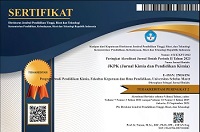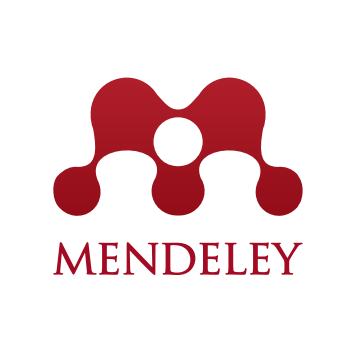Analysis of Chemistry Podcast Implementation in Learning Hydrocarbons and Petroleum for Inclusive Students
Abstract
Keywords
Full Text:
PDFReferences
REFERENCES
[1] P. Indonesia, “Keputusan Menteri Pendidikan, Kebudayaan, Riset, dan Teknologi Republik Indonesia Nomor 56/M/2022 Tentang Pedoman Penerapan Kurikulum dalam Rangka Pemulihan Pembelajaran,” 2022.
[2] C. Moser, “Manufacturing and Characterization of Cellulose Nanofibers,” KTH Royal Institute of Technology, 2019.
[3] D. Riyan Rizaldi and Z. Fatimah, “Merdeka Curriculum: Characteristics and Potential in Education Recovery after the COVID-19 Pandemic,” Int. J. Curric. Instr., vol. 15, no. 1, pp. 260–271, 2022.
[4] W. Ndari, Suyatno, Sukirman, and F. N. Mahmudah, “Implementation of the Merdeka Curriculum and Its Challenges,” Eur. J. Educ. Pedagog., vol. 4, no. 3, pp. 111–116, 2023.
doi: 10.24018/ejedu.2023.4.3.648.
[5] P. Haug, “Understanding Inclusive Education: Ideals and Reality,” Scand. J. Disabil. Res., vol. 19, no. 3, pp. 206–217, 2017.
doi: 10.1080/15017419.2016.1224778.
[6] D. W. Noviska and F. Anastasia, “Students’ Learning Styles (VRAK Model) in Learning English,” Didakt. J. Kependidikan, vol. 17, no. 1, pp. 58–70, 2023.
doi: 10.30863/didaktika.v17i1.4132.
[7] R. Apriati, T. Cicik, S. Budiman, and N. Sitoresmi, “The Application of Differentiated Instruction ( Learning Style) to Increase Students ’ Learning Outcomes at SMKN 6 Semarang,” Pendidik. Profesi Guru, pp. 1132–1142, 2023.
[8] S. Pang, “The Impact of a Podcast Project on Learning Outcomes: A Case Study of Two Content-based Courses,” Cambodia Educ. Rev., vol. 2, no. March, pp. 30–51, 2018.
doi: 10.31020/cer.2018.2.1.30-51.
[9] R. Tytler, C. Malcolm, V. Kirkwood, D. Symington, and L. Darby, Professional Development Provision for Teachers of Science and Mathematics in Rural and Regional Victoria. Waurn Ponds, Australia: Deakin University, 2009.
[10] W. Ghartey, D. U. Bunbun, S. D. Fenuku, and K. B. Ghartey, “The Effects of Digital Media Instruction on Senior High School Students’ Performance in Organic Chemistry Nomenclature,” Indones. J. Teach. Sci., vol. 1, no. March, pp. 97–108, 2024.
doi: 10.17509/ijotis.v4i1.68763.
[11] C.-T. B. Ho, Y.-H. D. Chou, and H.-Y. V. Fang, “Technology Adoption of Podcast in Language Learning: Using Taiwan and China as Examples,” Int. J. e-Education, e-Business, e-Management e-Learning Technol., vol. 6, no. 1, pp. 1–13, 2016. doi: 10.17706/ijeeee.2016.6.1.1-12.
[12] P. R. Kinasih and Mery, “Students’ Perception Towards Learning Literature Through Podcast,” Int. Conf. Lang. Linguist. Lit. Educ., no. August, 2022.
[13] S. C. Parija and P. Shanmuganathan, “Podcast — An Apt Learning Tool for Generation Z,” vol. 17, p. 12909, 2020. doi: 10.5005/jp-journals-10085-8121.
[14] J. Götborg, E. Schönbeck, and A. L. Hankers, “The Influence of Relationships on Podcasts’ Opportunities to Maximize Revenue,” Int. Bus. Sch., no. May, 2019.
[15] M. Khaund, “ICT in Education : The Potential of Podcasting,” 2007.
[16] S. S. Prakash, N. Muthuraman, and R. Anand, “Short-duration Podcasts as a Supplementary Learning Tool: Perceptions of Medical Students and Impact on Assessment Performance,” BMC Med. Educ., vol. 17, pp. 1–15, 2017.
doi: 10.1186/s12909-017-0864-0.
[17] T. B. Bell, A. C. Cockburn, A. W. Wingkvist, and R. G. Green, “Podcasts as a Supplement in Tertiary Education: an Experiment with Two Computer Science Courses,” pp. 1–8, 2007.
[18] H. Barjesteh and M. Ghaseminia, “Effects of Pre-Listening Task Types on the Development of EFL Learners’ Listening Comprehension Ability,” Int. J. List., vol. 0, no. 00, pp. 1–15, 2019.
doi: 10.1080/10904018.2019.1624087.
[19] W. R. Agarid and M. Nurzahra, “Analyzing Podcast Application To Improve Listening Ability,” Proj. (Professional J. English Educ., vol. 1, no. 3, p. 175, 2018.
[20] D. Dang, S. Moughnyeh, E. Stephens, V. Convers, S. Adkins-Jablonsky, and S. Raut, “A Pandemic Pivot: Podcast as an Active Engagement Tool in the Classroom and Beyond Teaching Tools and Strategies,” Teach. Tools Strategy., vol. 09, no. October, pp. 1–4, 2022.
[21] A. Carvalho, C. Aguiar, C. Carvalho, and R. Cabecinhas, “Influence of Podcast Characteristics on Higher Students’ Acceptance,” Educ. Technol. a Better World, vol. 302, no. November, pp. 417–426, 2009.
doi: 10.1007/s11528-009-0318-8.
[22] S. McClung and K. Johnson, “Examining the Motives of Podcast Users,” J. Radio Audio Media, vol. 17, no. 1, pp. 82–95, 2010.
doi: 10.1207/s15507408jram1701_9.
[23] L. E. MacKenzie, “Science Podcasts: Analysis of Global Production and Output from 2004 to 2018,” R. Soc. Open Sci., vol. 6, no. 1, 2019.
doi: 10.1098/rsos.181741.
[24] Sugiyono, Metode Penelitian Kuantitatif, Kualitatif, dan R&D. Bandung: Alfabeta, 2015.
[25] P. L. Leite, F. A. F. Torres, L. M. Pereira, A. de M. Bezerra, L. D. S. Machado, and M. R. F. da Silva, “Construction and Validation of Podcast for Teen Sexual and Reproductive Health Education,” Rev. Lat. Am. Enfermagem, vol. 30, no. Special Issue, 2022.
doi: 10.1590/1518-8345.5471.3572.
[26] R. D. Susilowati, Sutama, and N. Faiziyah, “Application of Podcasts on Spotify as a Mathematics Learning Media in the Middle of Covid-19 Pandemic,” J. Ris. Pendidik. Dan Inov. Pembelajaran Mat., vol. 4, no. 1, pp. 68–78, 2020.
doi: 10.24036/jrpipm.v4i1.251.
[27] A. Chan, M. J. W. Lee, and C. McLoughlin, “Everyone’s Learning with Podcasting: A Charles Sturt University Experience,” ASCILITE 2006 - Australas. Soc. Comput. Learn. Tert. Educ., vol. 1, no. January, pp. 111–120, 2006.
[28] Z. Cebeci and M. Tekdal, “Using Podcasts as Audio Learning Objects,” Interdiscip. J. e-Skills Lifelong Learn., vol. 2, no. January 2006, pp. 047–057, 2006.
doi: 10.28945/117.
[29] H. Koppelman, “Using Podcasts in Distance Education,” Proc. Int. Conf. e-Learning 2013, pp. 303–310, 2013.
[30] P. Edirisingha, G. Salmon, and J. Fothergill, “Profcasting: A Pilot Study and Guidelines for Integrating Podcasts in a Blended Learning Environment,” Res. competence Dev. Online distance Educ. e-learning, no. January, pp. 127–137, 2007.
[31] D. Tapp, “The Innovative Use of Podcasting to Support Under-Represented Groups,” Innov. Pract. High. Educ., vol. 1, no. April, pp. 1–8, 2013.
doi: 10.11120/iphe.2013.00001.
[32] R. Darwis, “Students ’ Perceptions Towards the Use of Podcast in Learning English: a Case Study of the Second Grade Students at One High School in Bandung,” J. English Educ., vol. 4, no. 2, pp. 80–100, 2016.
doi: 10.24815/jee.v4i2.4157.
Refbacks
- There are currently no refbacks.








